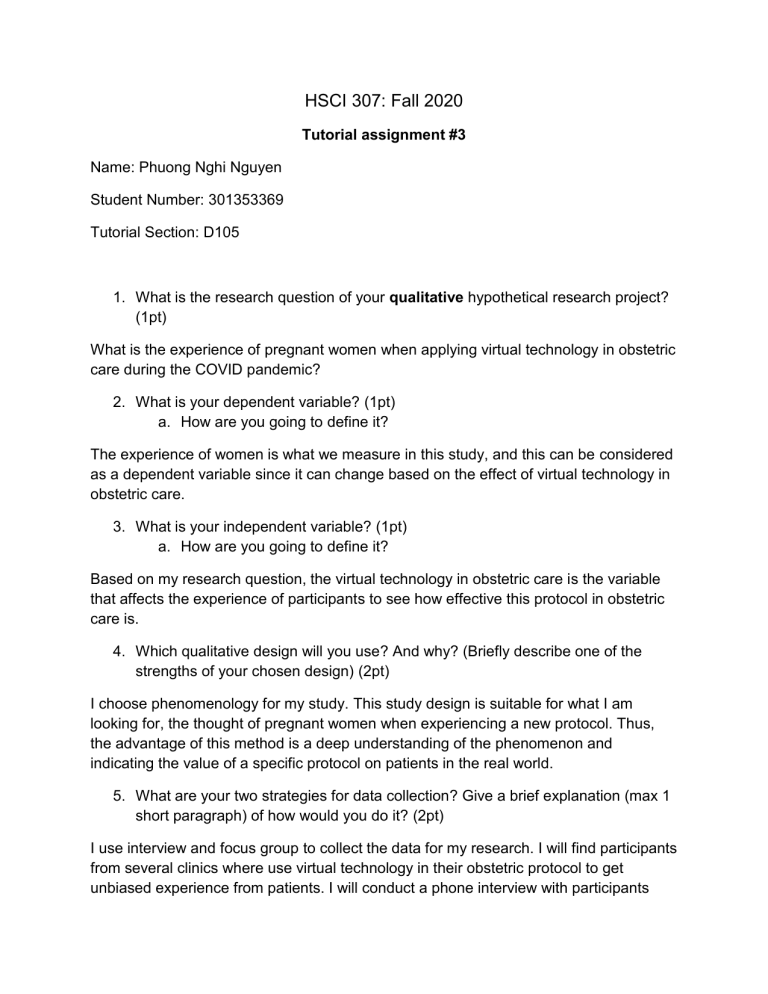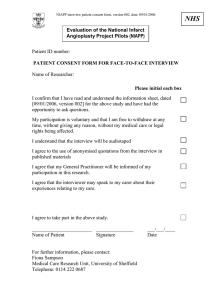
HSCI 307: Fall 2020 Tutorial assignment #3 Name: Phuong Nghi Nguyen Student Number: 301353369 Tutorial Section: D105 1. What is the research question of your qualitative hypothetical research project? (1pt) What is the experience of pregnant women when applying virtual technology in obstetric care during the COVID pandemic? 2. What is your dependent variable? (1pt) a. How are you going to define it? The experience of women is what we measure in this study, and this can be considered as a dependent variable since it can change based on the effect of virtual technology in obstetric care. 3. What is your independent variable? (1pt) a. How are you going to define it? Based on my research question, the virtual technology in obstetric care is the variable that affects the experience of participants to see how effective this protocol in obstetric care is. 4. Which qualitative design will you use? And why? (Briefly describe one of the strengths of your chosen design) (2pt) I choose phenomenology for my study. This study design is suitable for what I am looking for, the thought of pregnant women when experiencing a new protocol. Thus, the advantage of this method is a deep understanding of the phenomenon and indicating the value of a specific protocol on patients in the real world. 5. What are your two strategies for data collection? Give a brief explanation (max 1 short paragraph) of how would you do it? (2pt) I use interview and focus group to collect the data for my research. I will find participants from several clinics where use virtual technology in their obstetric protocol to get unbiased experience from patients. I will conduct a phone interview with participants with a set of question about how they feel about the protocol, is there any difficulty while using the virtual technology, and what is health outcome after the pregnancy, etc. I will set up an extra group interview with 6-10 people so participants will feel comfortable to share their experience, the questions will be different and more like discussion group with a broader topic. 6. What is one specific strategy that you will follow to ensure the trustworthiness or the rigor of your findings? (1pt) To ensure the rigor of the research’s result, I use data collection strategy, especially triangulation. I will collect data from different clinics instead of one place to get different experience of patients. 7. Complete the informed consent form from the following pages with the information pertinent to your hypothetical research project. You should only modify the sections highlighted in yellow. (2 pts) Informed Consent Patients’ Experience with Virtual Care in the Obstetric Protocol during COVID-19 Pandemic A. WHO IS CONDUCTING THIS STUDY? Principal Investigator: Phuong Nghi Nguyen Designation: B.Sc student, Faculty of Health Sciences Email Address: pnnguyen@sfu.ca Phone Number: 236-123-4567 Faculty Supervisor: Cecilia Sierra-Heredia, B.Psych, MA, MSc. Designation: Lecturer, Faculty of Health Sciences Email Address: sierrahe@sfu.ca Phone Number: (778) 782-3440 B. WHO IS FUNDING THIS STUDY? This research study is unfunded. Conducting this study is part of an undergraduate course on research methods in the Faculty of Health Sciences at Simon Fraser University. C. WHY SHOULD YOU TAKE PART IN THIS STUDY? You are being invited to take part in this research study because you are a pregnant woman who has visited the obstetric clinic where uses virtual technology in their pregnancy care protocol during the COVID pandemic. I am conducting this study to learn more about the effect of virtual technology in obstetric care on patients’ satisfaction. D. YOUR PARTICIPATION IS VOLUNTARY Your participation is voluntary. You have the right to refuse to participate in this study. If you decide to participate, you may still choose to withdraw from the study at any time without any negative consequences. E. WHAT HAPPENS IF YOU SAY, “YES, I WANT TO BE IN THE STUDY?” If you decide to take part in this research study, you will participate in the phone interview and a group interview with Phuong Nghi Nguyen. You will be asked to reflect on your experiences with using virtual care for your periodic examination. The interviews will take approximately 120 minutes in total. This phone interview will occur at a time and place that is convenient for you. F. POTENTIAL BENEFITS OF THE STUDY There may or may not be direct benefits to you for participating in this study. You may find talking about your experiences with virtual technology in obstetric care interesting, satisfying, or enjoyable. Your participation in this study will be helping an SFU undergraduate student complete part of her education. The information learned in this study may be used in the future to help improve obstetric clinic service during COVID-19 pandemic. G. POTENTIAL RISKS OF THE STUDY I do not think there is anything in this study that could harm you or be bad for you. If you tell me about a frustrating or painful experience in your interview, you may find that you are upset during or after your interview. You are not required to answer any questions that make you feel uncomfortable. Feel free to skip any questions, stop answering a question, or take a break at any time. H. WILL YOU PAID FOR YOUR TIME/TAKING PART IN THIS RESEARCH STUDY? You will be paid 20 Canadian dollars for your time or for taking part in this study. I. HOW WILL YOUR IDENTITY BE PROTECTED? Your name will not be associated with these findings nor will it appear in any documents that are created after the interview completion. Any information about you will have an identification number instead of your actual name. Any paper documents containing personal information will be kept in a locked cabinet separate from the rest of the study materials and will be destroyed 6 months after this research project is completed. J. WHAT IF I DECIDE TO WITHDRAW MY CONSENT TO PARTICIPATE? Taking part in this research project is entirely voluntary and you can stop at any time without having to give a reason. You can decide not to take part or to stop or to refuse to answer any question at any time. If you choose to withdraw your consent, you can also request the withdrawal of your data. K. ORGANIZATIONAL PERMISSION Permission to conduct this research study as part of the graduate research methods course has been obtained from the SFU Office of Research Ethics. L. STUDY RESULTS The results of this study will be reported in the publication. No identifying information, such as your name, will be released or included in the class assignment. M. WHO CAN YOU CONTACT IF YOU HAVE QUESTIONS ABOUT THE STUDY? Should you have any questions regarding the consent process, interview participation and/or data collection, you may contact Phuong Nghi Nguyen, email: pnnguyen@sfu.ca, and telephone number 236123-4567. You may also be in touch with the course instructor: Cecilia Sierra-Heredia, email: sierrahe@sfu.ca or telephone 778-782-3440. N. WHO CAN YOU CONTACT IF YOU HAVE COMPLAINTS OR CONCERNS ABOUT THE STUDY? If you have any concerns about your rights as a research participant and/or your experiences while participating in this study, you may contact xxxxxxxxxx, Director, Office of Research Ethics, email: xxxxxxxx or telephone:xxxxxxxx. O. PARTICIPANT CONSENT AND SIGNATURE PAGE Taking part in this study is entirely up to you. You have the right to refuse to participate in this study. If you decide to take part, you may choose to pull out of the study at any time without giving a reason and without any negative impact. Your signature below indicates that you have received a copy of this consent form for your own records. Your signature indicates that you consent to participate in this study. You do not waive any of your legal rights by participating in this study. Print Name of Participant: ____________________________________________ Signature of Participant: ______________________________________________ Date (Day/Month/Year): ____________________________


